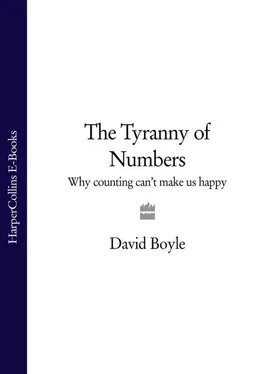So I came away from the cinema determined to make sure I flung my tuppence away on some little old bird woman, rather than marvelling at the strange alchemy of compound interest if I put it in the bank. I was not going to be a George Banks. Yet here I am, 35 years later, with my pension and life insurance, living in a world completely overwhelmed by numbers and calculation.
It’s the same for nearly all of us. There are personal calculations to be made each day, about investments, journey times, bank machines and credit cards. There are professional figures at work, in the form of targets, statistics, workforce percentages and profit forecasts. As consumers, we are counted and aggregated according to every purchase we make. Every time we are exposed to the media, there is a positive flood of statistics controlling and interpreting the world, developing each truth, simplifying each problem. ‘Being a man is unhealthy,’ said the front page of the Evening Standard recently, adding – like every similar newspaper article about statistics – the word: ‘official.’ As if we had been wondering about the truth all these years and, thanks to the counters, we now know. As if the figures are so detached that there is no arguing with them.
But of course we keep arguing. Just as the government keeps arguing despite its battery of benchmarks, quality indicators and league tables, as it struggles to hold back chaos like King Canute in front of the waves. We take our collective pulses 24 hours a day with the use of statistics. We understand life that way, though somehow the more figures we use, the great truths still seem to slip through our fingers. Despite all that calculating, and all that numerical control, we feel as ignorant as ever.
Mary Poppins might have been talking about me when she said that ‘sometimes a person we love, through no fault of his own, can’t see past the end of his nose’. She meant George Banks, of course, but I feel just as myopic myself. Life never keeps still long enough to measure anything important.
If you are said to be ‘calculating’, people could mean one of two things about you – both related and equally repellent. It could mean that you are constantly comparing what is best for you in any given situation. This is not a compliment. It implies something cold, fish-like and completely self-interested. But it could also mean you are someone who counts too much, someone who measures things but can’t see the reality behind them.
There is something equally clinical about that, but disinterested rather than self-interested. A calculating person, in this sense, is someone for whom the world past the end of their nose is a foreign country. And although we have become exactly that with all our counting, and increasingly so, it can send a shiver down the spine when you come across extreme examples. Like the eighteenth-century prodigy Jedediah Buxton, in his first trip to the theatre to see a performance of Shakespeare’s Richard III. Asked later whether he’d enjoyed it, all he could say was that there were 5,202 steps during the dances and 12,445 words spoken by the actors. Nothing about what the words said, about the winter of our discontent made glorious summer; nothing about the evil hunchback king.
Today, Buxton would probably be described as autistic. It is particularly horrifying to hear that his numbers turned out to be exactly right.
The story is funny now as then, but it is also faintly disturbing, and I have been wondering why this is. It could be that we see Jedediah Buxton as a fearsome symbol of the modern age, counting everything but seeing the significance of nothing. But I think it is deeper than that. There is something inhuman about it – not so much the ability to count, but the failure to be moved. We shiver, I think, at anybody with no emotions – as if they were completely amoral, like Dr Strangelove. We shrink from white-coated doctors too like cold calculating machines. Even doctors should be slightly fallible.
Even so, we encounter these ‘calculating’ machines almost every day. It’s hard not to turn on the news without audibly tripping over one of them. Like the academic who refuses to pass judgement on any problem, however urgent, because there hasn’t been enough research. Or the politician who is so obsessed with the polling figures that he can no longer trust his gut instincts. Or the social scientist who has laboriously proved with the use of statistics something which anybody else with an ounce of common sense knew already – that the death of a parent can scar a child for life, or that alcoholics have an unusually high depression rate. It’s official, they say. Like the University of Michigan study which revealed that children who don’t take exercise and eat junk food tend to be fatter. Or the recent research which showed that areas of high unemployment tend to have fewer jobs.
Then there are the familiar people who muddle up the numbers with the truth. Or, even worse, those who think you can change the truth just by changing the statistics. Don’t forget those dismal agriculture ministers who urged the public to listen to the scientists over the safety of BSE beef (and really believed it) even though they were quietly suppressing the research of anybody who argued that it might not be safe to eat.
These are modern monsters, but none of us can completely escape the accusation. We’re all tied up with figures, even if they are just cricket averages and lottery numbers.
Romantics and leftists traditionally say this is a bad thing. Romantics think that it reduces the individual to mere figures. Leftists think it’s a kind of tyranny. They are both wrong in the sense that we do need to be able to count – but they are right too. The strange thing is that ratcheting up the calculations has often been done for excellent humanitarian reasons, driven by impeccably radical reformers. Of course in the history of the tyranny of numbers over life there are crazed scientists and Nazis with branding irons who stalk through the pages. This is no scientific history of counting, and there is no account of the great statistical pioneers like Herbert Spencer or Karl Pearson. Nor does it cover the byways of scientific research or IQ – or the people who really believed you could control individuals by counting them.
But counting was also a way of improving the world. Maybe they wanted to prove the existence of great inequality or disease, like Edwin Chadwick. Maybe they wanted to find a way of aggregating the national accounts to defeat Hitler, like John Maynard Keynes. Or maybe they wanted to force politicians to worry about people’s happiness, like Jeremy Bentham. All the historic interludes I’ve chosen in this book fall into that category. They are people who – for the best of motives – brought forth the flood of numbers and calculations into the non-scientific parts of our lives.
It still is a way of improving the world. Are your schools not performing as well as they should? Then measure their results. Are you worried about the performance of a local council, a company, a great institution, a hospital? Send in the auditors, set some standards as benchmarks. You don’t trust the professionals? Summarize their decisions in number form, send in the cost-benefit experts and keep your beady eye on them. It is the modern way. Numbers – like money – drive out the mysterious power of elites, the clubbable atmosphere of the professions, the we-know-best patronizing attitudes of those thick-set people with glasses and firm handshakes who used to lord it over our lives. We can control them if we can reduce their complex professionalism to numbers.
The trouble is that the numbers have proliferated, and it’s sometimes hard to breathe – still less tell the difference between one statistic and another. It is difficult enough to remember your car registration number, PIN number, home, work and mobile phone numbers all at the same time. It’s almost enough to make you coldly calculating.
Читать дальше












